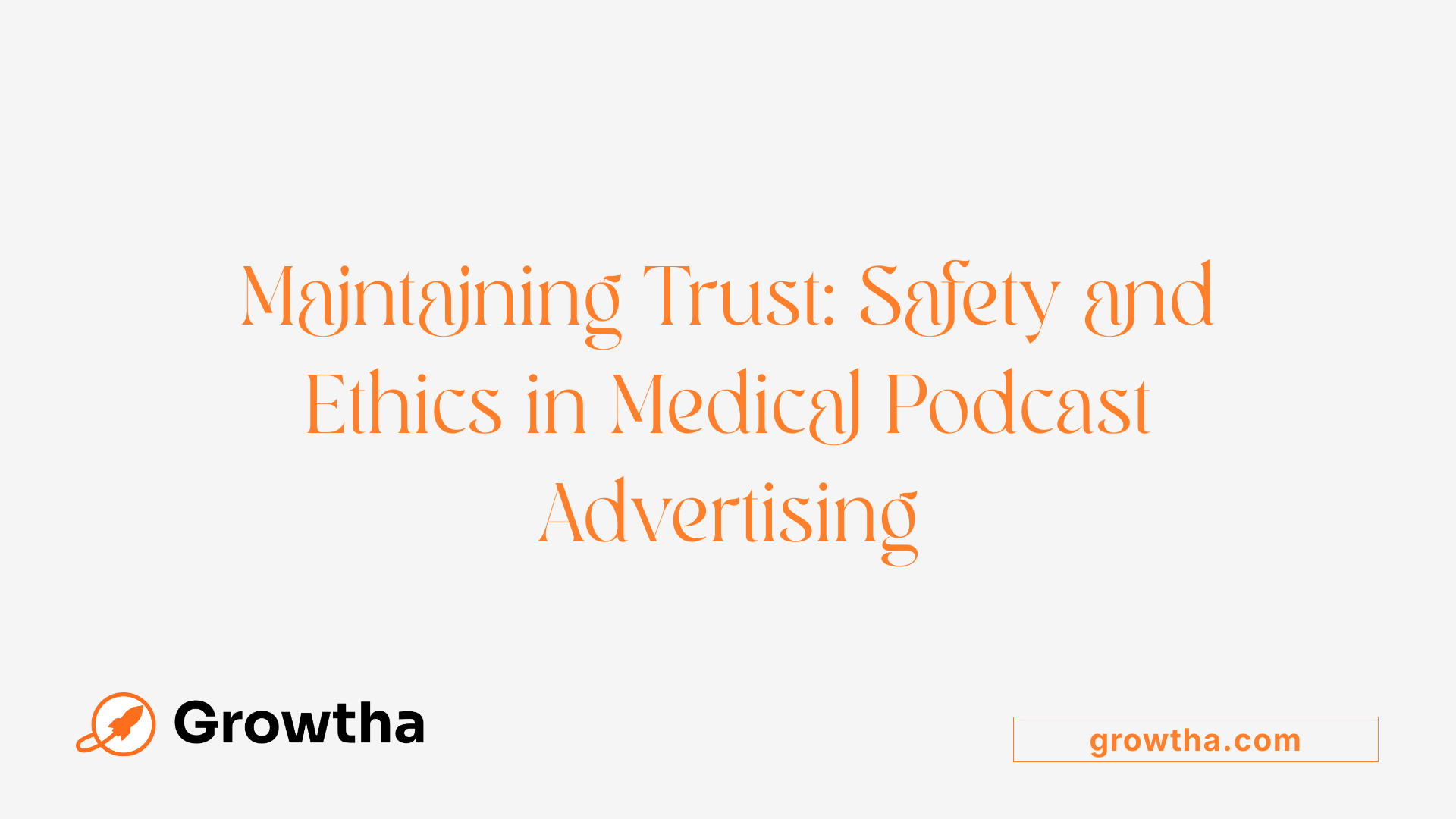The rapidly growing popularity of podcasts presents a unique opportunity for healthcare organizations to connect with targeted audiences in a more personal, trusted, and cost-effective manner. As more consumers and professionals turn to audio content for information and engagement, leveraging podcast advertising has become essential for medical marketing and patient outreach. This article explores the benefits, strategies, targeting methods, ethical considerations, and industry trends related to using podcasts to effectively reach healthcare audiences.

Podcasts provide an effective platform for healthcare organizations and professionals to connect with specific audiences in a personalized and engaging way. Their niche focus allows marketers to reach relevant consumers and healthcare providers with greater precision than traditional media channels.
Listeners tend to be highly engaged, often tuning in during activities like commuting or exercising, which amplifies the exposure and impact of advertisements and educational content. Recent studies indicate that 62% of respondents find podcast advertising among the most effective, with 76% recalling at least one advertised product or service.
Healthcare professionals turn to podcasts as trusted sources for continuous learning and industry updates, with 21% considering them vital for staying current. These platforms allow for the dissemination of complex health information through expert interviews, research discussions, and patient stories, fostering trust, credibility, and a human connection.
Podcasts also promote community building by reducing feelings of isolation among patients and individuals facing health challenges. They help dismantle stereotypes, support mental well-being, and encourage healthier lifestyles by providing accessible, encouraging content.
From a marketing perspective, podcasts are cost-effective, offering long shelf lives and multipurpose content repurposing options such as blogs or social media snippets. Their ability to establish thought leadership and create a loyal following enhances brand recognition and patient loyalty.
Furthermore, the personal, trustworthy nature of podcasts aids in brand positioning and emotional engagement, often leading to action, such as booking appointments or participating in clinical trials. With the rapid growth of health and lifestyle podcasts—up 50% over five years—they have become an integral part of healthcare outreach strategies, providing measurable, targeted, and meaningful connections with both patients and providers.

Podcasts are increasingly vital tools in health and wellness communication, bridging complex medical topics with everyday listeners. They provide accessible, in-depth, and credible information, making health messages easier to understand and more engaging.
These audio programs can reach diverse audiences, including patients, healthcare professionals, and the general public. Through expert interviews, patient stories, and discussion of recent research, podcasts support initiatives in health promotion, behavior change, and health literacy.
Organizations such as the CDC leverage podcasts like 'Listen Up!' and 'Public Health On Call' to address urgent health issues, promote public awareness, and challenge misinformation. By doing so, they turn complicated topics—like vaccines, reproductive health, and health disparities—into digestible content that builds trust and understanding.
Podcasts also help foster a more informed community by translating scientific findings into relatable language. They reach audiences during everyday activities like commuting or exercising, maximizing exposure and engagement.
Overall, podcasts strengthen health communication efforts by making vital health information more accessible, trustworthy, and impactful, ultimately encouraging healthier behaviors and improved public health outcomes.
Podcast advertising offers a powerful way to connect with healthcare audiences, including professionals, patients, and caregivers. Its ability to engage a dedicated and attentive listener base—many of whom listen during commutes or exercise—enhances ad exposure and retention.
The growing popularity of health topics, with a 50% increase in listeners over five years, underscores the channel's relevance. Healthcare brands can tailor their messages by selecting podcasts focused on relevant health issues, industry trends, or patient experiences. This relevance boosts recall, with 76% of listeners able to remember advertised products or services.
Targeting is further refined through programmatic ad insertion, which allows dynamic placement, geotargeting, and audience segmentation. Host-read ads and sponsored messages build trust, as listeners often trust hosts and consider their recommendations.
To ensure safety and content alignment, tools like SeekrAlign™ utilize AI and adhere to guidelines like GARM, helping brands choose credible, suitable podcasts. This strategic selection builds credibility and ensures the messaging resonates authentically.
Combining targeted content with social media promotion, educational materials, and trustworthy hosts creates a comprehensive communication pathway. This approach not only raises awareness but also fosters engagement and trust among both healthcare professionals and patients, making podcast advertising a compelling element of healthcare marketing.

When it comes to healthcare podcast advertising, understanding how to effectively reach the right listeners is essential for success. Differentiating your approach based on audience segmentation can make campaigns more targeted and impactful.
One of the primary methods involves demographic, psychographic, and health-related segmentation. Marketers analyze factors such as age, gender, health interests, and lifestyle to identify listener groups that align with their messaging. This allows for tailored content and ad placements that resonate deeply with specific audiences.
Digital and data analytics tools have become crucial. Platforms like Comscore Predictive Audiences enable advertisers to utilize proprietary data, content analysis, and predictive modeling to pinpoint precisely targeted listener segments. These tools help identify audience behaviors and preferences, ensuring that ads reach consumers or healthcare professionals most likely to be interested.
Aligning ads with the content of each episode through contextual advertising also boosts relevance. For example, promoting diabetes management products during a podcast episode focused on endocrinology creates a natural and engaging ad experience.
Addressing specific niches and geographic areas enhances local engagement and recruitment efforts. This is especially valuable for healthcare organizations targeting regional patient populations or particular medical specialties.
To summarize, effective targeting methods include:
Method Description Benefits Relevance-Based Selection Choosing podcasts that discuss specific medical topics or serve particular patient groups Ensures content aligns with audience interests Demographic and Psychographic Segmentation Using data like age, gender, health behaviors, online activity Facilitates personalized and targeted ad delivery Data Analytics Tools Utilizing platforms like Comscore Predictive Audiences Provides detailed audience insights and precise targeting Contextual Advertising Serving ads tied directly to episode themes Increases ad relevance and engagement Geographic and Niche Targeting Focusing on local regions or specialized fields Enhances local outreach and niche marketing
Leveraging these strategies allows healthcare brands to craft campaigns that are not only relevant but also more likely to foster trust and drive meaningful action among listeners. This approach ensures that advertising efforts are smarter, more personalized, and more effective.

Yes, there are crucial safety and ethical issues that healthcare marketers and podcasters need to keep in mind. First and foremost, any advertising or educational content must be based on accurate, evidence-based information. Avoiding misleading claims and ensuring transparency helps maintain trust with the audience, which is especially vital in healthcare.
Protecting patient privacy is another key area. When discussing medical conditions, treatments, or success stories, sensitive data should never be disclosed without explicit consent. Upholding confidentiality aligns with legal standards like HIPAA and supports ethical communication.
Compliance with healthcare advertising regulations is essential for credibility. There are guidelines on how medical products and services can be promoted, and ignoring these can harm not only reputation but also result in legal repercussions. Marketers should actively adhere to industry standards to foster trust.
While many podcasts do not directly discuss advertising ethics, the underlying principles—honesty, transparency, and respect for patient rights—are universally applicable. Responsible podcast advertising supports the credibility and integrity of healthcare narratives and ensures audiences receive reliable, safe information.

The healthcare podcast advertising landscape is experiencing significant growth, driven by increased consumer and professional engagement. Investment in health and wellness content has surged, with a strategic focus on storytelling and patient-centered messaging that resonates deeply with audiences.
Popular podcasts such as The Patient Convert, Digital Health Today, and The Medical Marketing Podcast exemplify successful collaborations. These partnerships provide platforms for healthcare brands to showcase innovations, share insights, and deliver actionable information tailored to industry professionals and consumers alike.
In addition to brand awareness, podcasts serve as effective tools for continuous learning, competitive analysis, and tracking emerging trends. Current topics include advancements in AI applications in healthcare, health tech developments, and strategies for expanding multi-location practices.
Content varies from short-form updates, like Gist Healthcare Daily and 10 Minute Healthcare Marketing, to in-depth episodes that explore complex issues and new research.
Healthcare podcast advertising is increasingly measured by its ROI, with campaigns designed to comply with regulations such as HIPAA and tailored to niche markets. Overall, the industry is maturing, emphasizing targeted, compliance-conscious, and results-driven approaches that capitalize on the format’s capacity to build trust, influence behavior, and foster engagement.
As the podcast landscape continues to evolve, healthcare organizations and advertisers are increasingly recognizing the immense potential of podcasts as a versatile, credible, and engaging platform. With advancements in targeted advertising technology, AI-based safety tools, and strategic content development, the reach and impact of healthcare podcasts are set to grow significantly. Embracing this medium not only enhances communication with healthcare professionals and patients but also fosters trust, education, and health-promoting behaviors. By staying aligned with industry trends and ethical standards, healthcare entities can leverage podcasts to build meaningful relationships, improve health outcomes, and position themselves as innovative leaders in health education and outreach.